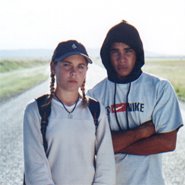clouded futures

I'm depressed. Here's a review.
Beneath clouds is an Australian film, made a couple of years ago, with a simple, intensely focussed narrative line. Two young people,
The script is very economical, but also very realistic, as it fits with the laconic, defensive nature of the protagonists. A great deal of the film’s complexity and subtlety is conveyed without words. For example, the pair (and it should be pointed out that Vaughn is clearly aboriginal, while Lena, whose mother is aboriginal, passes for a white girl, and is thought of as such by Vaughn, until near the end of the film) are picked up by a kindly, elderly white man in a black Mercedes. No words are spoken during this car ride, which lasts for several minutes of screen time, nor are words exchanged when he drops the pair off and turns into his property, yet the emotional complexity of the scene is palpable. In fact the whole film has a heavy emotional weight, achieved through the extensive use of close-ups and the clear framing of symbolic moments, in terms of landscape (and the film beautifully illustrates the point, obvious perhaps but still worth emphasising, that landscape is all construction), and human interaction. All credit to the director, Ivan Sen (who, like Kubrick, started out as a photographer) and his cinematographer, Allen Collins.
We first observe the girl,
I don’t want to provide a précis of the film here, but I want to try to capture with a few examples what I liked about it.
Subtlety and no easy sympathy or side-taking. When Vaughn is in gaol, or in remand, he plays the tough guy. A white guy working next to him tells him to cool it, and he flares up. The white guy flares up in his turn, and the two confront each other, chests out, testosterone oozing from every pore. Neither have any intention of backing down, and the tension is broken by the intervention of a prison guard. There’s a shot of the white guy’s eyes blazing – with what? Is it racial hatred? Is it a more personal hatred of Vaughn? Or is it just part of playing the uncompromising tough guy? It’s a simple scene, on the surface of it, but its near-wordlessness, together with the raw anger/hatred displayed, helps create an atmosphere of nameless oppression, an atmosphere that pervades the world of both protagonists – though it weighs most heavily on Vaughn.
Landscape and perception. Vaughn and
Beyond clouds is visually magnificent and emotionally complex and nerve-wracking. It has haunted me since I’ve seen it, and I think I understand why. A number of personal resonances. It captures the contrasts of the Australian interior, its menace, its savagery, its monotony and unpredictability. It offers no solutions for its characters, though it offers them examples of genuine kindness and of brutishness – it’s up to them to negotiate matters, to gather what resources they can to push in what direction they choose. It’s neither a hopeful film nor one that underlines hopelessness. It simply gives us a glimpse into the lives of two troubled, bright young people trying to make their way out of unhappiness. It should be applauded and rewarded for what it’s trying to do and what it actually achieves.
There’s an anonymous but extremely useful and agreeable review of the film here.


2 Comments:
An awesome review of a very beautiful and understated movie... If you lined up those movies in order of quality I'd say 'Beneath Clouds' first, 'Tracker' (absolutely powerful!) second and 'Rabbit-proof Fence' third. RPF is a good movie but, but it is so much more difficult to identify with the "whites" (for me anyway) in that one I think.
Understated is the word - it's trying to capture experience as it's confusedly felt, whereas so many films have a narrative to them with all the fake order and clarity of hindsight. I believe the director's now trying to work in the US, where understatement seems almost a foreign word, possibly untranslatable. We'll see.
Post a Comment
Subscribe to Post Comments [Atom]
<< Home